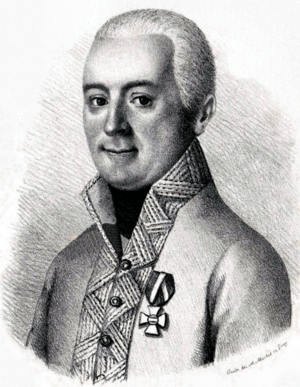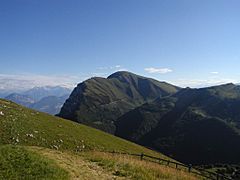Franz Joseph, Marquis de Lusignan facts for kids
Quick facts for kids
Franz Joseph, Marquis de Lusignan
|
|
|---|---|
 |
|
| Born | 23 June 1753 Jaca, Spain |
| Died | December 23, 1832 (aged 79) Ivanovice na Hané, Austrian Empire |
| Allegiance | |
| Service/ |
Infantry |
| Years of service | 1771-1809 |
| Rank | Feldzeugmeister |
| Battles/wars | War of the Bavarian Succession Brabant Revolution French Revolutionary Wars Napoleonic Wars |
| Awards | Military Order of Maria Theresa |
| Other work | Inhaber, Infantry Regiment # 16 |
Franz Joseph, Marquis de Lusignan (born June 23, 1753, died December 23, 1832) was a Spanish soldier. He joined the Habsburg army. He fought against soldiers from Prussia and rebels in Belgium. During the French Revolutionary Wars, he was important at the Battle of Rivoli in 1797. He later became a general officer. He led large groups of soldiers during the Italian campaign of 1799. In the Napoleonic Wars, he commanded a division two times. He was badly hurt in 1809 and had to leave the army. From 1806 until he died, he was the owner of the Lusignan Infantry Regiment.
Early Military Career
Lusignan was born on June 23, 1753, in Jaca, Spain. In 1771, he joined the Habsburg army. He started as an ensign in the Ferraris Infantry Regiment # 14. He fought with a volunteer group during the War of the Bavarian Succession.
He became a major in 1789. He was stationed in the Austrian Netherlands (modern-day Belgium). The next year, he showed great skill near Liège. He defeated many Belgian rebels with only a small group of soldiers. For this, he received the Knight's Cross of the Military Order of Maria Theresa. This was a very important award.
As a lieutenant colonel, Lusignan led 800 foot soldiers and 100 cavalry. This was during two days of fighting near Virton, in modern-day Belgium. On October 22, his group was attacked by a much larger French force. His troops were defeated, and the fight continued the next day. On October 23, his outnumbered soldiers were defeated again. They lost 43 men and 11 horses.
He also fought at the Battle of Jemappes in November 1792. A month later, French soldiers captured him. He was held until he was exchanged for a French prisoner. In 1794, he became a colonel. He took command of the Klebek Infantry Regiment # 14. In 1795, he fought near the Upper Rhine River. He captured a fort during the Battle of Mainz in 1795. In August 1796, he commanded one of the advance groups before the Battle of Lonato.
The Battle of Rivoli
In January 1797, General Jozsef Alvinczi gave Lusignan a special command. He was to lead the 1st Column during the fourth attempt to help the city of Mantua. His orders were to take 4,556 men. They had to march along the very top of the Monte Baldo mountains. These mountains were covered in snow and ice in winter. It was a very difficult task.
Lusignan's march was slower than planned because of the harsh conditions. But he kept going and reached his assigned spot. During the Battle of Rivoli, Alvinczi told him to march again. This time, he was to go behind Napoleon Bonaparte's French army. He followed his orders. However, he found himself alone on a hill, far from the main fight.
By the afternoon of January 14, Bonaparte had defeated the other Austrian groups. Lusignan's soldiers were attacked from the north and blocked from the south. He tried to escape to the west. But his tired soldiers were captured by the hundreds. About 3,000 men from his column were taken prisoner. Lusignan, however, managed to escape.
On February 28, 1797, Lusignan became a major general. Two weeks later, he was captured again. This happened while he was leading the rearguard during Archduke Charles's retreat from Italy.
He served in Italy during the War of the Second Coalition. On April 5, 1799, he led a brigade at the Battle of Magnano. He was wounded three times there. During 1799, he sometimes acted as the commander of the division. He led a division at Marengo on May 16, 1799. He also commanded a brigade at the Battle of Novi on August 15. Emperor Francis II promoted him to lieutenant field marshal on January 30, 1801.
Napoleonic Wars and Retirement
In 1805, Lusignan took command of a division in the Tyrol. In 1806, he became the owner of the Lusignan Infantry Regiment # 16. He held this position until he died.
During the War of the Fifth Coalition in 1809, he commanded a division. While leading his troops at the Battle of Teugen-Hausen on April 19, 1809, he was wounded in the head. This injury forced him to retire from the army. However, the emperor was grateful for his service. On May 29, the emperor promoted him to the rank of general of artillery.
Franz Joseph, Marquis de Lusignan, died on December 23, 1832. He passed away in Ivanovice na Hané, which is now in the Czech Republic.
See also
 In Spanish: Franz Joseph, Marqués de Lusignan para niños
In Spanish: Franz Joseph, Marqués de Lusignan para niños
 | Aurelia Browder |
 | Nannie Helen Burroughs |
 | Michelle Alexander |


